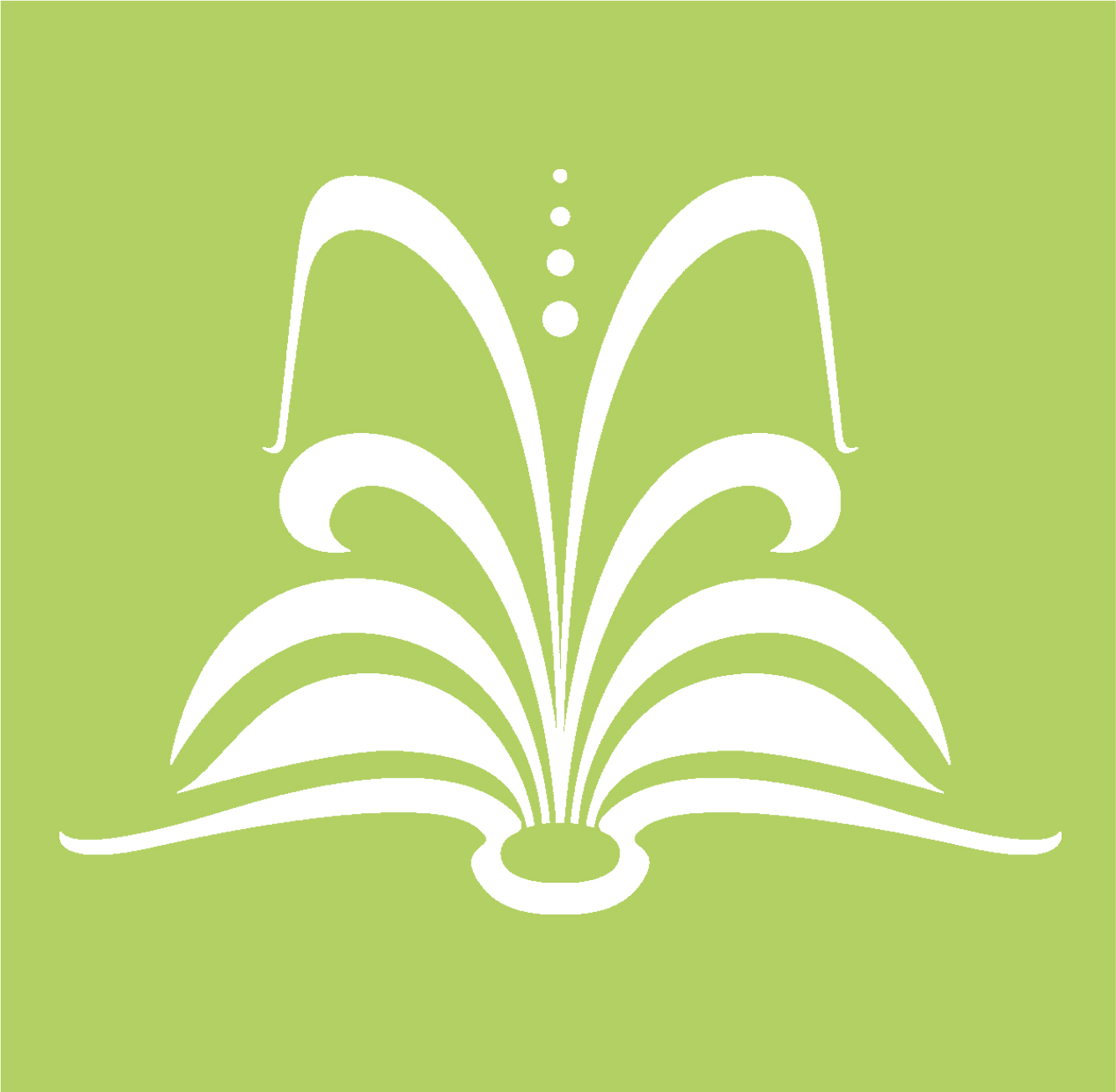Blog
Mrs Borlase’s ‘minced Pyes’
Charlotte MacKenzie is currently researching Cornish legends and historical individuals, including healthcare and folk customs in Georgian Cornwall. She popped into the Morrab Library in the autumn to use our Archive for some of her research. Along the way, she encountered Mrs Borlase’s recipe for ‘Minced Pyes’ and Charlotte has kindly written a blog for us about them.
One of the hidden treasures of the Morrab Library is a manuscript recipe book compiled by the Borlase family at Castle Horneck. Which includes a recipe for ‘minced Pyes’.
To make minced Pyes
Take Eggs & boyle them very hard when cold then mince them very Small, to one pound of Eggs two pounds of beef Suett one pound of Currants & ye Same Seasoning as you doe to your other minced pyes.
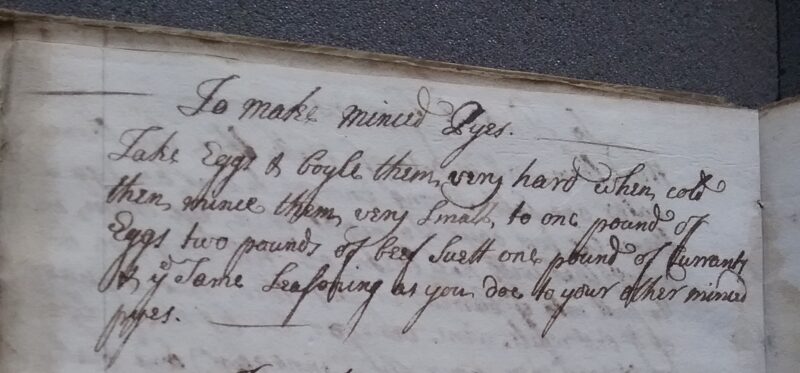
Charlotte’s photograph of Mrs Borlase’s recipe for ‘Minced Pyes’ which can be found in the Archive collection at Morrab Library
The quantities for the mincemeat filling suggest the household at Castle Horneck got through quite a lot of minced pies.
The book as a whole is of interest partly because it contains recipes and advice on family healthcare and first aid. Caring for family health, ailments, and illnesses was considered part of household management, which might also include attention to the well-being of horses or livestock. The Borlase family book was not unique. Recipe books like that of the Borlase family were mostly kept by women, whose responsibilities for family and household management included healthcare. And all kinds of recipes were sometimes shared between women in their family and social circles.
The book is organised as collections of recipes. For coughs, colds, fevers, headaches, itches, and digestive disorders; and first aid for scalds and cuts. The recipes were intended to relieve acute symptoms and promote healing, and did not include general pain relief. Information about whether and when recipes were prepared and applied is lacking. Some entries have an annotation that the recipe came from a named individual, including some prescriptions by medical practitioners, or were copied for possible future use from published books or magazines.
The book includes one recipe for a topical application for the head to cure ‘madness’; and many concoctions for ailments at every life stage and in different parts of the body – from sore nipples (presumably of nursing mothers) to steadying giddiness in the head; as well as a small number of prescriptions from medical practitioners. Plus other household requisites such as how to make ink and hair dye, and recipes for horses.
Although the Borlase family could afford to consult medical practitioners – and sometimes did – Cornish recipe books confirm that households were partly self-reliant in managing health and illness.
It is an approach which can be seen in the writings of William Borlase, whose brother Walter’s family had lived at Castle Horneck. In the 1760s, the health of William’s wife Anne improved, and he wrote to a friend, the Cornish born physician William Oliver in Bath, that ‘Our only physick for the last year has been no other than the air on the beach below the house, where we daily make our almost only visits, and pick pebbles’. After being widowed, Borlase later wrote that his own prescription for health in old age was to ‘read, write, and ride’.
A fascinating glimpse into early Cornish Fiction
Library member and PhD student, Kensa Broadhurst, has delved into the world of early Cornish Fiction, and uncovered some delights you may wish to explore yourself….
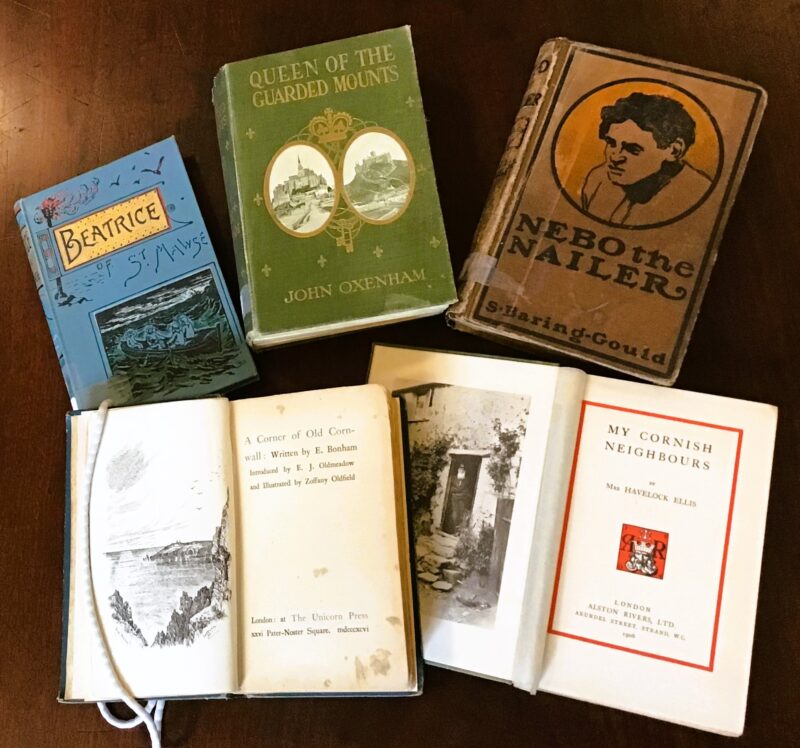
Over the past year I have been working my way steadily through the Cornish fiction collection in the Jenner room. I should perhaps clarify this a little. I am currently in the final stages of a PhD researching the use of the Cornish language between 1777-1904. As part of this research, I was interested to see if any of the novels written in or about Cornwall pre-1904 either mention the language or use Cornish words. This meant I was interested in reading any of the novels in the collection with a publication date before around 1910. There are some novels in the collection with no publication date in them. To be on the safe side, I did borrow these. Often it was easy to tell if the novel must have been written later in the twentieth century through the context.
These criteria meant I could avoid the shelves full of the works of Daphne du Maurier and Winston Graham, but it has still taken me the best part of year to work my way through the relevant books from the collection alongside my other studies. This may give you some idea as to the size of the Cornish fiction collection housed in the library (I’m a quick reader!). Although there are novels by authors who had been inspired by a visit they had made to Cornwall, many of the books are by Cornish authors and are specifically based in West Penwith.
Unsurprisingly for novels set in West Penwith either in the nineteenth century or earlier, several themes emerge: Methodism, mining, smuggling and wrecking feature heavily, alongside many tales of unrequited love and quite a few mining accidents. For people interested in the social history of Cornwall in the nineteenth century, these novels are a real treasure trove. There are also several novels which detail the adventures of young girls who are shipwrecked on the Cornish coast, rescued, and grow up unaware of their true identity, only for everything to be resolved perfectly at the end with a hugely coincidental reveal! A couple of examples of these include Mona the Fisher Girl by H.S. Streatfeild and Beatrice of St Mawse [no named author].
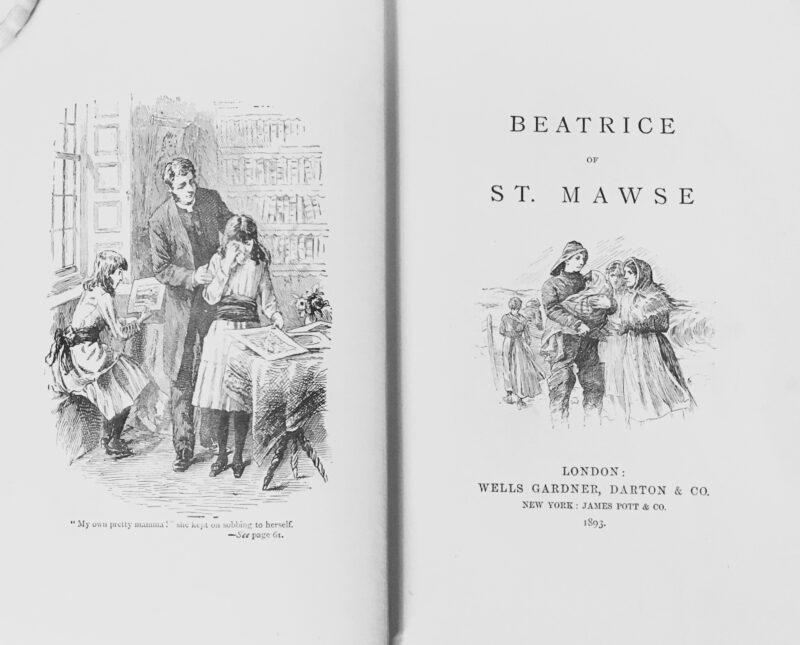
There are novels by well-known novelists such as Deep Down by R.M. Ballantyne, the Scottish author best remembered for The Coral Island. He came to Cornwall to research tin mining for this novel. There are also many novels by the Reverend Sabine Baring-Gould from Devon. He was well-known as a writer of hymns and served as President of the Royal Institution of Cornwall. Examples of his novels include Guavas the Tinner and The Crock of Gold. Famous Cornish novelists such as Katharine Lee, the Hocking siblings, and William Sandys also feature prominently.
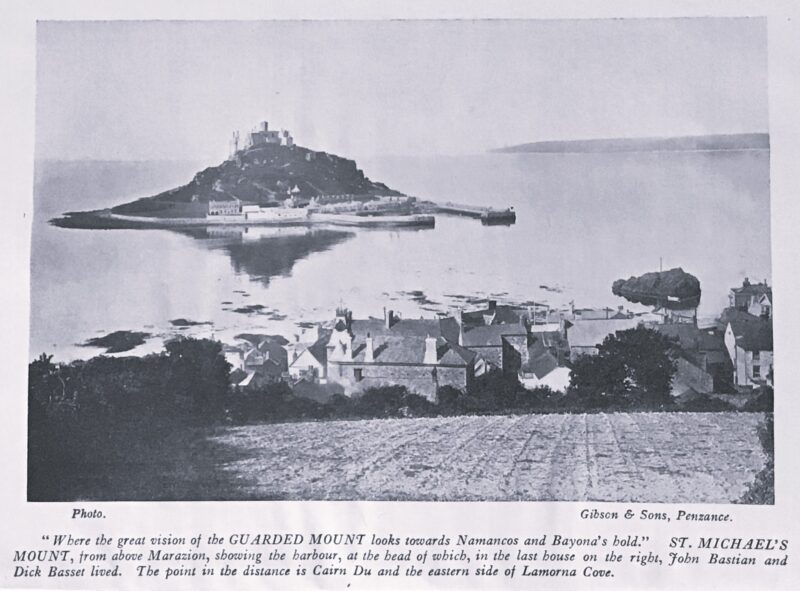
So would I recommend a delve into nineteenth century Cornish fiction as a change from your usual reading fare? There are some gems to be discovered. If you like an adventure story filled with derring-do try Queen of the Guarded Mounts by John Oxenham which is set on St Michael’s Mount and Mont-Saint-Michel during the French Revolution. If you want a bit of romance in the Cornish landscape, there’s Kynance Cove by William Bentinck Forfar. For some insight into life in Cornwall at this period see E.A. Bonham’s A Corner of Old Cornwall or Mrs Havelock Ellis’s My Cornish Neighbours. Or perhaps just show some neglected books some love – in many cases I was evidently the only person who had borrowed these novels for decades!
Patricia Eschen Prize for Poetry 2022 – Winners announced!




Penelope Shuttle described the process as a “fascinating and educative experience” and went on to say that “reading the poems was exhilarating and often profoundly moving.”


The poems were judged anonymously, so the judges were excited to discover that they had chosen such an international shortlist with poets hailing from all over the world, as far afield as Christchurch (New Zealand), Lagos (Nigeria) and Florida (U.S.A) with plenty of poets from across the U.K. too and one of the shortlist a Morrab Library member from Penzance.
We thought we’d tell you a little bit more about the competition winning poets and also share clips of the poets reading their winning poems in their own voices at our hybrid event which took place at The Exchange in Penzance earlier this month.
Camilla Lambert
Camilla Lambert was awarded first prize for her poem ‘Gifts from a Lithic Lover’. You can read the poem here or watch Camilla reading her poem here.
Cornwall has been a major source of inspiration for Camilla’s writing, stemming from time spent over the years with family on both the north and south coasts of Cornwall. This was reflected in her winning poem and Katrina Naomi introduced the poem by saying: “This poem does some amazing things around love, around geology, around the days of the week. It makes me think of a week very differently to how I used to think of a week. There’s so much imagination. There’s a bit of Cornwall, alongside places all around the world in this poem. It’s very imaginative and shows real ambition. And for Penny and I, it was a clear winner”.
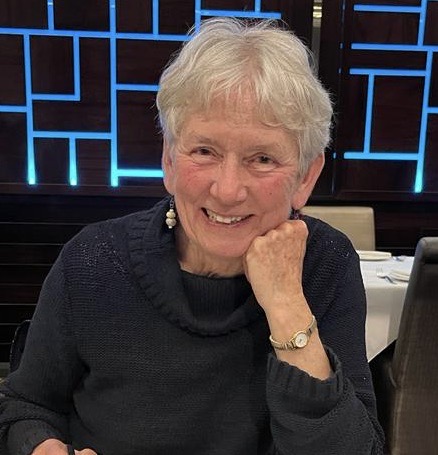
She began writing poetry in 2007 on retirement from being an NHS manager. Since then she has had individual poems published in poetry journals, organises an arts festival in Sussex and had her pamphlet Grapes in the Crater published in 2015. She is now working on her full collection.
Marjory Woodfield
Second prize was awarded to Marjory Woodfield from Christchurch New Zealand for her poem ‘Sails Catch the Wind’. You can read the poem here or watch Marjory read the poem here. As Marjory explained at the awards ceremony, the prompt for her poem was a bowl from a shipwreck with a gazelle on it which was found by the husband of her former landlady in Singapore, a shipwreck diver.
Penelope Shuttle introduced the poem at the event: “Here we have a lyric poem, beautiful and delicate as the Chinese porcelain, whose journey from raw clay to finished, painted bowl, is beautifully described. There’s a lost ship. There’s porcelain fished up from the sea. There’s the painted gazelles on the bowl. This poem […] conveys the vulnerability and beauty of the world and, by lovely implication, all of us here on earth”.

Anna Remennik
The third prize winner in the Patricia Eschen Prize for Poetry 2022 was Anna Remennik from California (U.S.A) for her poem ‘Kyiv, spring 1986’. You can read the poem here or watch Anna reading the poem aloud here.
Anna grew up in Soviet-era Kiev (now Kyiv, Ukraine) and is now a chemical engineer working in Silicon Valley. She enjoys writing poems about automatic titrators, technical supply chain processes, and occasionally even more fantastical things.
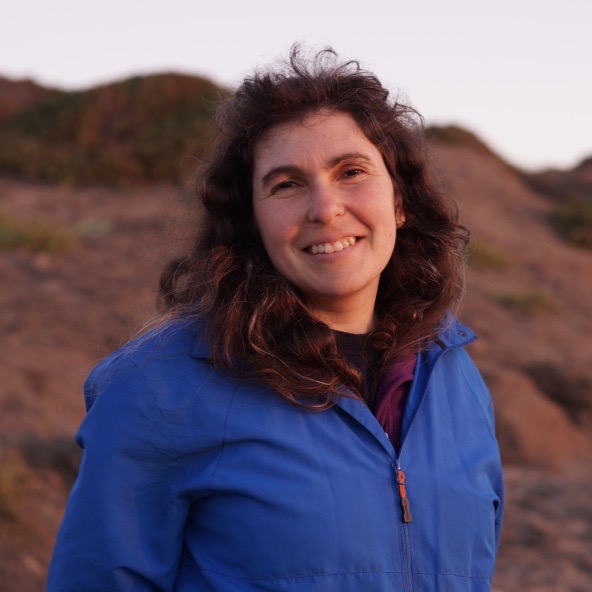
Anna added: “Although I wrote this poem a couple of years ago, it’s been especially in my mind with everything that’s going on currently”.

Children’s competition:
Penelope and Katrina were both truly “wowed” by the quality of the poems in the children’s category.
Penelope Shuttle said “The standard of the children’s poetry was exceptionally high. Well done all! And congratulations to the teachers for giving their students, however young, deep access to the imagination, and the power of articulation.”
The children’s competition received over 200 submissions and the judges were so impressed by the calibre of entries that they decided to appoint joint second and joint third prize winners, generously supported by the Dennis Myner Trust.
Dexter Warburton, aged 13, won second prize for her poem called ‘A Boy Talking To A Robot In The Future About Where He Lives’ which you can read here. Caterina Williams was awarded joint second prize for her poem ‘The Flow of Words’, which you can read here.
The judges loved the form of the joint third prize winner, 7 year old Ziva Patel’s poem, ‘Refugees’ which you can read here. 9 year old Benjamin Williams, younger brother of Caterina Williams, was the joint third prize winner for his poem ‘Nonsense Safari’ – the judges particularly loved the rhymes in this poem which you can read for yourself here.

You can read many the highly commended poems, in the adult’s and children’s category, on the website here.
Morrab Library, The Dennis Myner Trust and our judges would like to congratulate all of the shortlist poets and say a big thank you to everyone who took the time to enter the competition!

